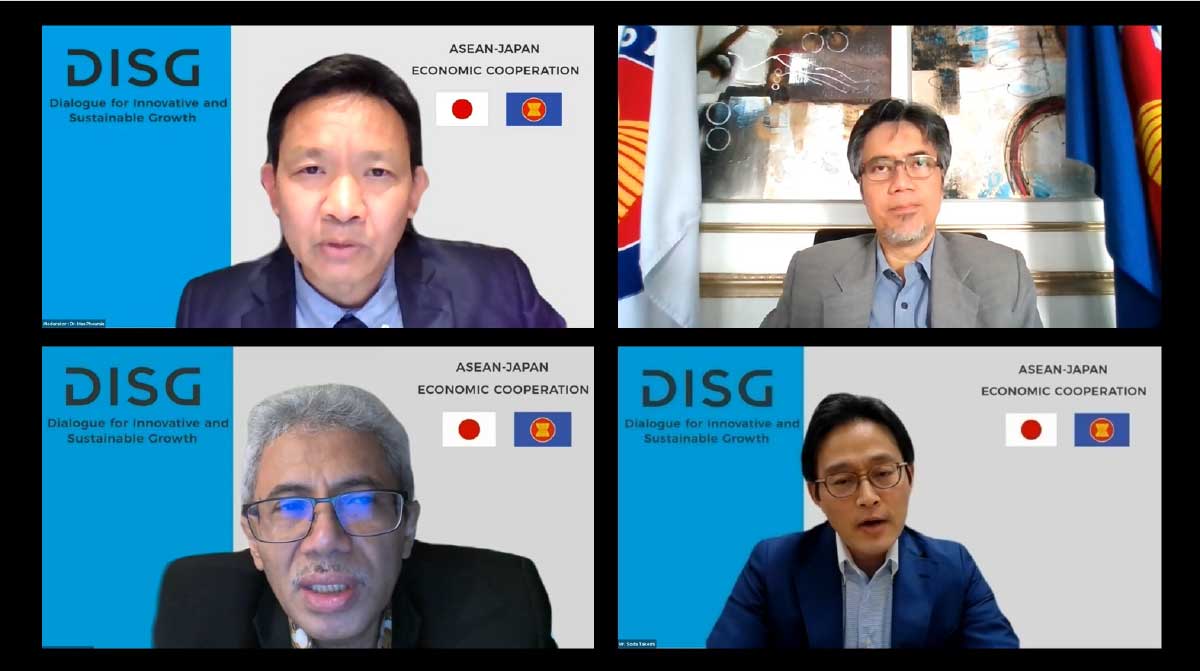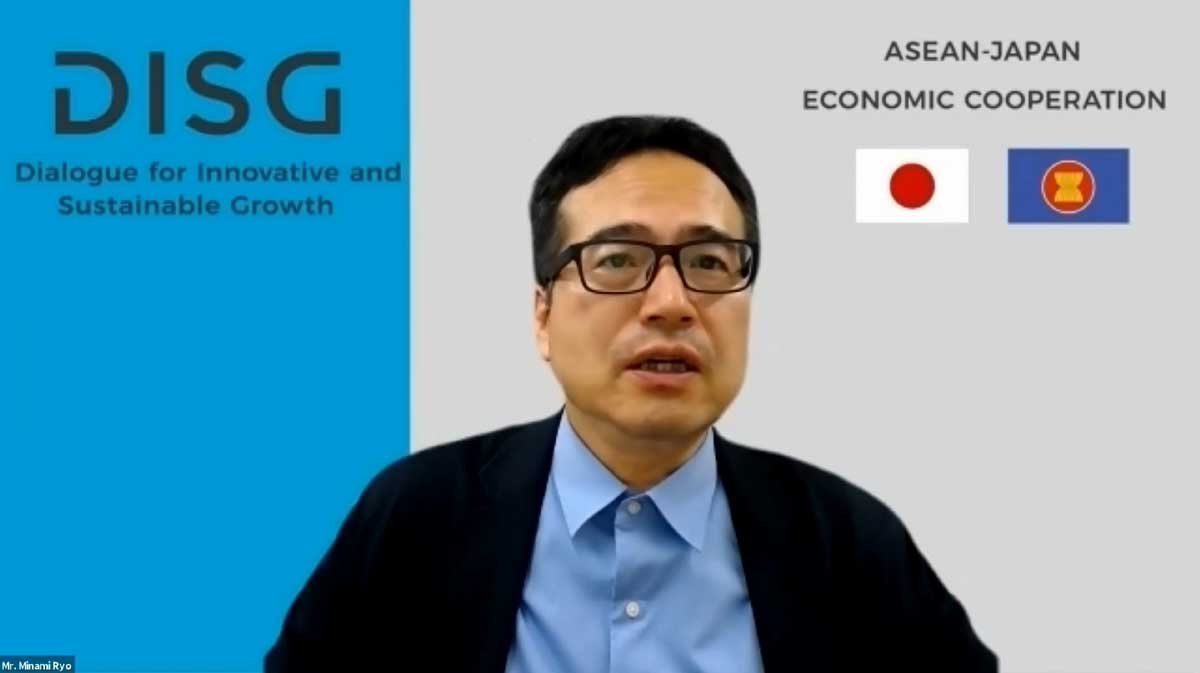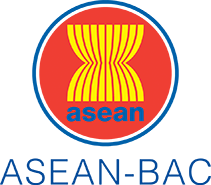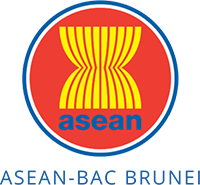summary
August 26th 2021
6th Webinar: Promoting Green Growth and Energy Transition in ASEAN region
(Archived Video: click here)

Agenda
1. Opening Remarks from ASEAN Economic Community
2. Keynote speech from METI
3. Panel discussion between METI, ACE, MEMR and ERIA
Speaker
-
H.E. Satvinder Singh
Deputy Secretary-General of ASEAN for ASEAN Economic Community -
Mr. Minami Ryo
Deputy Commissioner for International Policy on Carbon Neutrality, Ministry of Trade, Economy and Industry (METI), Japan -
Mr. Soda Takeshi
Director for International Affairs, Commissioner's Secretariat, Agency for Natural Resources and Energy (ANRE), Ministry of Trade, Economy and Industry (METI), Japan -
Dr. Nuki Agya Utama
Executive Director, ASEAN Centre for Energy (ACE) -
Dr. Saleh Abdurrahman
Senior Advisor on Environment and Technology for Ministry of Energy and Mineral Resources (MEMR), Indonesia
Moderator
-
Dr. Han Phoumin
Senior Energy Economist, Economic Research Institute for ASEAN and East Asia (ERIA)
Webinar Summary
(Opening Remarks)
H.E. Satvinder Singh, Deputy Secretary-General of ASEAN for ASEAN Economic Community, stated that the huge challenges brought by the COVID-19 pandemic to economies and societies at large has also presented new opportunities to leverage green growth and sustainable development into the key strategies that drive post-pandemic outlook. ASEAN’s strategies for recovery, articulated in the ASEAN Comprehensive Recovery Framework (ACRF), is well-aligned with ongoing efforts to facilitate energy transition and promote resilience through the ASEAN Plan of Action for Energy Cooperation (APAEC) Phase II: 2021-2025, which in turn reinforces ASEAN’s overall pursuit of green growth and sustainable development.
Highlighting ASEAN’s ongoing efforts on exploring all available pathways to achieve the region's energy security and energy transition goals, H.E. Satvinder Singh emphasised the crucial importance of energy transition financing and access to technology to support clean energy deployment in a secure, affordable, and inclusive manner. To this end, H.E. Satvinder Singh explained that effecting long-term energy transition in the region calls for holistic and concerted approach that includes strengthening partnerships with Dialogue Partners, International Organisations, the private sector and other external partners, to access financing, investments and technologies.
In this regard, ASEAN treasures its continuing strategic partnership with Japan in advancing mutually beneficial economic and energy initiatives that align with the region’s diverse circumstances. H.E. Satvinder Singh also recalled that ASEAN Energy Ministers welcomed Japan's Asia Energy Transition Initiatives (AETI) which provides a wide range of support for transition in the region. Through this webinar, H.E. Satvinder Singh looked forward to a richer and more concrete discussions of ASEAN and Japan’s initiatives in pursuit of decarbonisation through green growth.
(Keynote Speech)
Mr. Minami Ryo introduced Japan’s Green Growth Strategy and Japan’s pioneering carbon neutrality mission, and called for three important points to be considered for ASEAN to effectively approach energy transition; 1) there are many different paths toward a carbon-neutral energy transition for each country, 2) it is necessary to create various innovations in order to explore all types of energy and technologies, and 3) it is necessary to actively engage ASEAN countries by providing support for the introduction of innovative technologies.
In line with this, Mr. Minami introduced “Asia Energy Transition Initiative (AETI)” as a Japan’s comprehensive support for the realisation of various and pragmatic energy transition in Asia, in which ASEAN will also be part of the initiative. Related with this, the first Asia Green Growth Partnership Ministerial Meeting (AGGPM) will be held on 4th October this year, where ASEAN and other countries will share the concept of energy transition. Japan is currently cooperating with ERIA and making progress in discussions with each country to support the development of a roadmap. Leveraging from Japan’s experience advancing towards carbon neutrality goal, Japan has planned to help ASEAN in energy transition through various approaches and multifaceted supports such as finance support, technology development and human resource development.
(Panel Discussion)
At first, all of 3 panelists, Dr. Nuki Agya Utama from ASEAN Centre for Energy, Dr. Saleh Abdurrahman from Ministry of Energy and Mineral Resources, Indonesia and Mr. Soda Takeshi from METI introduced their expertise and experiences related to sustainable growth and energy transition followed by discussion on below three topics.
The 1st topic was “The current efforts and challenges for energy transition in ASEAN”. Dr. Nuki shared current ASEAN initiatives to achieve carbon neutrality while there remain several challenges to ASEAN member state highlighting that financing and investment is the biggest challenges. Dr. Saleh also emphasized that affordability for end users is extremely important to ASEAN countries, thus, the roadmap needs to be carefully assessed on the least cost scenario. In return, Mr. Soda introduced ongoing and future initiatives from Japanese government that have been planned to help ASEAN countries to achieve the carbon neutrality goal.
The 2nd topic was “Important circumstances and conditions when promoting energy transition in ASEAN”. Dr. Nuki highlighted that there is no one single solution that can be applied to all ASEAN countries at the same time since each country has different circumstances and conditions. Dr. Saleh added on that the importance of the certainty, clarity and consistency on policy for investors and consideration on each country’s energy potential. Mr. Soda agreed on Dr. Nuki and Dr. Saleh’s points and emphasized that Japan will provide tailor-made support on development of a roadmap toward carbon neutrality which reflects each country’s uniqueness.
The 3rd topic was “Necessary international cooperation and further cooperation between ASEAN and Japan for Green Growth and Energy Transition”. Dr. Nuki and Dr. Saleh both agreed that required international support will be financing, investment, technology and know-how that need to be flexible and able to adapt with different country conditions. Dr. Saleh also encouraged to concentrate on R&D with different potential energies of each ASEAN country. For example, Indonesia has high potential to develop new sources of renewable energy from geothermal, biomass, and hydrogen etc. Mr. Soda reiterated that the roadmap will be flexible to suit best with each country‘s conditions and up to country’s leaders or experts to decide what would be the best roadmap for their country. He also introduced that Japanese government is currently moving forward to enhance cooperation with each ASEAN country by having more intensive discussion with participants consisting of government, industries and financial institutes from ASEAN counties and Japan to develop a roadmap towards carbon neutrality together.
Opening Remarks

H.E. Satvinder Singh, Deputy Secretary-General of ASEAN for ASEAN Economic Community pointed out that energy transition presents huge opportunities for economic growth, and facilitating this calls for holistic and concerted efforts to access financing, investments and technologies that are crucial to support clean energy deployment in a secure, affordable, and inclusive manner.
The COVID-19 pandemic has impacted the economy and community unprecedentedly. But it has also presented us with fresh opportunities to leverage green growth and sustainable development with key strategies to drive recovery during the post-pandemic period. Our ASEAN Comprehensive Recovery Framework (ACRF), the region’s exit strategy from the pandemic, is therefore infused with principles of building a better, more sustainable future, enhancing resilience towards future shocks, and maximising opportunities to realize the potential of ASEAN’s internal markets and broader economic integration agenda. ASEAN’s strategies for recovery align well with the ongoing efforts to facilitate energy transition and to promote resilience through the ASEAN Plan of Action for Energy Cooperation (APAEC) Phase II: 2021 -2025. In return, it reinforces the ASEAN’s overall pursuit of green growth and sustainable development.
While we know that the region will continue to depend on a mix of fossil fuels and renewables to meet its low-carbon energy goals in the immediate future, ASEAN Member States have collectively set ambitious energy efficiency and renewables targets relative to the region’s current capabilities and resources. ASEAN is committed and will continue to explore all available pathways to achieve the region’s energy security and energy transition goals amidst the challenges of the pandemic, efforts to reclaim the region’s growth trajectory and aspirations to contribute to the global collective effort of lowering carbon emission.
As energy transition progresses in the region and globally, and as we strengthen policy frameworks and enabling environment to foster sustainable investments, energy transition financing and access to technologies to support clean energy deployment in a secure, affordable, and inclusive manner remain crucial. It is important to approach energy transition as an all-of-society undertaking. It is also an enormous opportunity to grow our economies, to further trade and economic cooperation, and to build green supply chain ecosystems in our communities, and to create green jobs under the notion of a new sustainable economy.
Indeed, facilitating an effective long-term energy transition in the region will calls for holistic and concerted efforts, including developing partnerships with our Dialogue Partners, International Organisations, the private sector and other external partners, to access financing, investments, and technologies to make it all happen.
To this end, ASEAN truly treasures its continuing strategic partnership with Japan in advancing mutually beneficial economic and energy initiatives that align with the region’s diverse circumstances. We appreciate that Japan continues to reach out to enhance its cooperation with ASEAN, while recognizing the diverse national circumstances and unique energy policies of ASEAN Member States, as our region works hard to address energy security and economic competitiveness alongside energy transition.
On June 21 this year, our ASEAN Energy Ministers welcomed Japan’s “Asia Energy Transition Initiative (AETI)” which provides a wide range of support for transition in the region. I understand that today discussion will go deeper into AETI in the context of promoting green growth. I believe I speak for all participants today in looking forward to a richer and more concrete discussion of the economic opportunities available to us as we link ASEAN and Japan’s energy transition initiatives and as we together pursue the road to decarbonisation through green growth. I wish you all of you a most successful forum today. Thank you very much!
Keynote Speech

Mr. Minami Ryo, Deputy Commissioner for International Policy on Carbon Neutrality, Ministry of Trade, Economy and Industry (METI), Japan, introduced Japan’s initiatives to achieve carbon neutrality goal and highlighted ongoing efforts and beyond of ASEAN-Japan collaboration in energy transition.
Japanese Government’s Initiatives Towards Carbon Neutrality
In the concern of global warming issue, there is a widespread trend towards “Green Growth”. Japan is also committed to doing its utmost to achieve carbon neutrality by 2050 and 46% reduction of greenhouse gas emissions by 2030. Last year, Japan’s Green Growth Strategy was formulated where the plan will be actively promoted with its innovative technologies and implementation to society. For example, 2 trillion Japanese yen fund is created by METI to support companies on the enabling environment to encourage bold investments and ground-breaking innovations. As a partner who fully recognizes the challenges that ASEAN is currently facing, Japan would like to support and cooperate with ASEAN countries in drawing up and implementing a roadmap for new economic development through “Green Growth”, making use of Japanese technology, industrial capability and experience.
Carbon Neutrality in Asia and Asia Energy Transition Initiative (AETI)
As ASEAN’s energy demand is expected to continue to grow in line with economic growth, there will be a lot of efforts needed to achieve carbon neutrality in the future. Japan considers three important points need to be taken into account. Firstly, it is important to recognize that there are many different paths toward a carbon-neutral energy transition for each country. Secondly, in pursuing the energy transition, it is necessary to create various innovations through research and development of innovative technologies, in order to explore all types of energy and technologies. Thirdly, it is necessary to actively engage ASEAN countries, not by solely suspending financial support for fossil fuels or divestment, but by providing support for the introduction of innovative technologies and financing to ensure that no single country in ASEAN is left behind in the transition to a low-carbon society. Also, an establishment of a framework and funding for new projects and technologies is highly important in order to create an enabling environment to foster investments from private sector.
In response to those key considerations, METI has come up with “Asia Energy Transition Initiative (AETI)” as a Japan’s comprehensive support for the realisation of various and pragmatic energy transition in Asia. On 4th October this year, Japan will hold the first Asia Green Growth Partnership Ministerial Meeting (AGGPM) where ASEAN and other countries will share the concept of energy transition. Currently, Japan is cooperating with ERIA and making progress in discussions with each country to support the development of a roadmap. Also, in order to achieve carbon neutrality in the future, other multifaceted support such as finance support, technology development and human resource development is needed, and various workshops and seminars are planned.
The Government of Japan will continue to support ASEAN countries in their global decarbonization efforts, with a view of “Promoting Green Growth and Energy Transition in ASEAN region” through various approaches from a medium- to long-term perspective.
Panel Discussion
Pillar 1: The current efforts and challenges for energy transition in ASEAN
ASEAN Energy Transition progress and biggest challenges
-
Dr. Nuki:
The energy transition is inevitable throughout the ASEAN region. Based on the study of ASEAN Energy Outlook, it shows that fossil fuel will continue to play a substantial role in ASEAN energy landscape and it is projected that oil, gas, and coal will make up nearly 85% share of total primary energy supply by 2040. In 2040, the carbon emission will lead to more than 4,000 million tons based on the study. The electricity and transportation sector are steeping out and remain as the biggest carbon emitter in Southeast Asia. The dependency of the fossil fuel may also raise some energy security issues. Diversification of energy supply such as renewable energy will have retain to reduce the dependency of fossil fuel which does not only limit to renewable energy, but alternative energy such as nuclear as well.
In terms of energy efficiency and conservation, ASEAN has exceeded the regional target at 20% in 2020 and is now on pursuit towards more ambitious target of 32% reduction by 2025. ASEAN also planned to achieve the new Renewable Energy (RE) target of 35% of total installed power capacity by 2025 which will contribute to achieving the aspirational RE target of 23% share in the Total Primary Energy Supply (TPES) by 2025.
By looking at the challenges, investment is one of the biggest challenges according to the study from ASEAN Energy Outlook showing that it will cost more than 500 billion dollars of investments in order to achieve the APAEC target by 2040. However, the study was considered on a long-term projection, hence, it is important to consider the least cost scenarios. Hopefully, by next year, it is expected to be more rational and more reflecting actual conditions by putting the study on the more least cost scenarios to find out what would be the best combination of the energy supply mix, power mix, up until 2050 and beyond.
Another challenge to consider is capacity and capability as ASEAN region needs a lot of new technologies to be introduced as well as expertise throughout globe to support the energy transition in ASEAN.
Challenge toward carbon neutrality from Indonesia perspective
-
Dr. Saleh:
Regarding the question about challenges on promoting the renewable energy development, first, as a developing country, a list of alternatives on energy development is necessary as the country needs to find the lowest price in developing or cost saved from electricity generation, for example. This is also in line with the fact that in our case we still have a very low electricity consumption per capita. As the country is now standing at around 1,100 kW-hour per capita, there is a need to accelerate the generation of electricity that it is still affordable for people. Secondly, most people are familiar with carbon economy, so it requires a lot of efforts to diversify the energy source by promoting energy diversification and also energy conservation. Thirdly, this is to agree with Dr. Nuki that the challenge is perhaps on the investment as the fact that national budget in each ASEAN countries, especially Indonesia, is very limited thus, no flexibility to allocate the budget to renewable energy so foreign investors are needed to support ASEAN countries in developing the renewable energy.
Also, according to Mr. Minami’s statement, ASEAN countries should not only be suspended on support for fossil fuels, but also need to find support on technology and finance. In doing this so, ASEAN member state will be more than ready to continue the cooperation with Japan and other countries on the pursuit of net zero carbon emissions target by 2060, to increase our electricity consumption per capita and to keep the economic growth.
Japanese government initiatives aiming to support ASEAN countries to achieve carbon neutrality
-
Mr. Soda:
Japan completely understands ASEAN countries challenges, especially about the investment on the energy infrastructure and also on a concern about fossil fuels that will be suspended in the near future due to the divestment movement. For this reason, as Mr. Minami mentioned about the ASEAN-Japan energy ministers meeting on 21st June, Minister Kajiyama explained the importance of declaring carbon neutrality to ASEAN Energy ministers in order to attract international finance. The Paris Agreement requires all countries to commit to achieve carbon neutrality during 2nd half in this century. However, Japan is not in a position to require ASEAN countries to set the target year or timeline of carbon neutrality, rather, it is 100% up to each ASEAN country to decide it. From this perspective, Japan is very pleased to hear that Indonesia has set its goal for achieving carbon neutrality by 2060 last month. This is a significant step forward in terms of promoting energy transition in ASEAN.
In addition, it is important to draw a roadmap to realize carbon neutrality. However, it should be difficult and complicated for other countries to do it alone by themselves. Therefore, ERIA and the Institute of Energy Economics, Japan (IEEJ), a Japanese Economic Research Institute, looks to provide a tailor-made assistance for each ASEAN country to draw its own roadmap towards carbon neutrality which Japan would like to support with projects and technologies positioned in the roadmap.
For that purpose, Japan has already prepared 10 billion dollars to support decarbonization projects in Asia. As mentioned earlier, in order to support an energy transition in ASEAN, Japan has launched Asia Energy Transition Initiative (AETI) which includes not only a support for drawing a roadmap, finance support but also support for human resource development throughout Asia with a support for sharing knowledge about decarbonization technologies by having workshops and webinar.
Pillar 2: Important circumstances and conditions when promoting energy transitions in ASEAN
No one single solution for every ASEAN country with different conditions and resources
-
Dr. Nuki:
By highlighting the discussion of the last ASEAN Ministers Energy Meeting (AMEM), 2020, ASEAN is focusing not only on shifting from fossil fuel to renewable energy, but also maintaining its affordability, reliability, resiliency, cleaner energy option and technology. In addition, it is very important that the transition is also made sure that it is secure enough and also accessible enough.
There is a collective agreement to achieve energy transition as a common goal among ASEAN countries, but it is important to mark that each country has their own uniqueness and energy system, specifically called as a resource base. Therefore, there is no single silver bullet or one single solution to address the challenges of energy transition, security, and sustainability.
Therefore, the direction should consider the country’s national social, economic circumstances, diverse energy resources, affordability to the people, appropriate technologies, financial resource, and culture. A different type of energy resource may need to be equally addressed and assessed to come up with options for any situation that can be applied with resource and technology. That being said, it requires for the advancement of technological innovation and there will be no sudden move forward, but in a gradual move manner towards decarbonization goal.
Importance of the certainty, clarity and consistency on policy
-
Dr. Saleh:
What is important is the certainty, clarity and consistency on policy which are considered as very important to let the circumstances switched, especially with investors. Indonesia has a clear target on energy mix to have a share of renewable energy at 23% by 2025. This is a challenge since currently we can only reach less than 15% in 2020. As we have some priority now to address with COVID-19 situation that results in the situation of renewable energy to become even more challenging.
Secondly, it is important to continue to create the conducive environment for investors such as providing the level of playing fields, and to provide more incentives both fiscal and non-fiscal for projects that promote energy transition.
However, given the uniqueness of each country, the support from developed countries should focus on potential energy in each country not only on solar and wind technologies. For example, in Indonesia, the country has high potential on geothermal, biomass, bioenergy that are also planned to be developed further for future energy mix.
Flexible model helping to draw a tailor-made roadmap for different countries with different strong points of energy system
-
Mr. Soda:
As Dr. Nuki and Dr. Saleh mentioned about the inequality, unique characteristics of each of ASEAN countries and there is no single way to achieve a carbon neutrality, Japan completely agreed of the importance of diversity and there should be a variety of pathways to achieve carbon neutrality. Regarding the concern, when a roadmap towards the carbon neutrality is drawn, the different circumstances of each country like energy mix, renewable potentials will be taken into account and as explained, ERIA and IEEJ have different roadmaps for this reason and they were based on actual data of country’s autonomy as well as assumption of cost reduction of the decarbonization technologies such as renewable and CCS. Then, the analysis shows the concrete roadmap towards carbon neutrality based on a focus of cost minimization in which the cheapest energy resources and technologies will be prioritized first and followed by more expensive ones.
However, a model is just a model, it is up to the government of each ASEAN country to decide which energy resources and technologies will be introduced. We can say again the model is like a second medical opinion while it depends on the country leaders / government who can draw its own roadmap while ERIA and IEEJ will only provide necessary information for reference and to support decision making.
Finally, to respond Dr. Saleh’s comment about country’s potential energy and resource base, as explained, Japan will still support for the energy transition with all technologies and all resources and once it is positioned in country’s roadmap towards carbon neutrality, then Japan can support in the framework of AETI to achieve the goal.
Pillar 3: Necessary international cooperation and further cooperation between ASEAN and Japan for Green Growth and Energy Transition
International support in terms of investments, technologies, and know-how
-
Dr. Nuki:
Supports from the government such as the policy signal to stimulate investments and innovation are needed to accelerate the energy transition. One of the examples of the policy support and implementation initiatives include collective policy vision, a target of energy efficiency and emission standard, business incentive as well as financial and technical incentives for R&D, etc. The best practices or knowledge sharing is important for building up the capacity and capabilities of the policy makers.
As ASEAN is looking at the least cost scenarios, it is important to step forward to looking at the potential of energy system in the perspective of the least cost. Also, learning from Japan, which is aiming for carbon neutrality in 2050, will be beneficial for ASEAN member state in further replicating the pathway based on each member state needs.
Another important thing is financial support as mentioned earlier on the APAEC projected scenarios and the outlook that ASEAN would need more than 500 million dollars for the power sector alone. This is necessary to explore an alternative financing, platforms, mechanism, and policy support to ensure adequate financing in the ASEAN region which international support may be the key here. Also, more mobilizing fund for public and private sector is important and it needs to be strengthened in order to establish a sustainable financing and process in the region.
Another thing is technology development, there are various interests from the ASEAN member state to explore the alternative technologies with capabilities of low carbon including hydrogen, SMR, CCUS, battery storage, carbon recycling and other technologies which potentially enhance on high efficiency and lower carbon emission. Affordability and the advancement of low carbon technology are also one of the main considerations for the transition in the region.
Joint R&D on each country’s potential source of energy and details on financing support
-
Dr. Saleh:
There are two tracks on this development of the international cooperation. First, it is on the public-related support which is expected coming from Japan and other countries. The support should concentrate more on joint R&D and project development on clean technology, blue and green hydrogen, ammonia, and the advanced biomass. Low carbon emission like CCUS and other renewable energy technologies should also be promoted to get international support as well. There are a lot of potential in Indonesia to be used as an area to proceed with intensive research like what Japan has been doing with some other countries. We also hope that Mr. Soda will update information on how to proceed with AETI support program and the financing support or how to get $10 billion support to help us in developing renewable energy program.
Second, there are Japanese investors in other ASEAN countries and Indonesia. Indonesia continues to strengthen cooperation for investments with all countries including Japan and is now working to improve all necessities to create conducive climate for investment. We are now finalizing the carbon pricing regulation as well as new pricing regulation on the renewable energy which it should be more attractive for investors. We also hope that the new types of cooperation of investment will not just concentrate on just renewable energy, but also on industry side so we can develop an integrated energy and industrial project with Japanese investors that will be much expected by our side.
A one step forward of ASEAN-Japan collaboration
-
Mr. Soda:
First, for the financing, as mentioned that Japan has already committed 10 billion dollars for financial support. In response to Dr. Saleh’s question about the update information about Japan’s support, this support is based on private companies’ activities and there are several Japanese companies have already talked with companies in Indonesia and they have already started some of the projects. Regarding the joint research program, Japan has already started some cooperation with Indonesian companies.
Second, which is technology issues, Japan will need to listen carefully to the voice of industries and ask them what type of decarbonization technologies are available, but if they’re still on R&D stage, then they will be asked when to be commercialized in order to select the right technologies. This is very important to have intensive discussions between the government and industries in the near future, we look forward to having a dialogue for government and industries including Indonesia and Japan. Not only intensive discussion between government and industries, financial institutions should also be invited to join to crystalize the roadmap to be more feasible, more practical, and also more powerful.
Lastly, the capacity building is very important for any countries to achieve carbon neutrality. It takes several decades to complete energy transition, then in order to know and keep up with a rapid, evolving and changing trend in energy and decarbonization technology, it is necessary for young people to broaden their views and to follow technology trends as well as the geopolitics related with energy and climate. In that sense, Japan would like to host a series of webinar and workshop to develop human resources in ASEAN and welcome for any opinions or ideas on those workshop sessions.
Final remarks and expectation
-
Dr. Nuki
In our opinion, gradual changes on energy system especially toward energy transition is way much better rather than sudden shifting such as the reduction of carbon in the power sectors, in energy supply side, and also from demand side. To shift from fossil-based fuels to zero carbon emissions, we need to have credible strategies and a solid plan that is in line with the least cost scenario. In Southeast Asia, affordability is one of the important keywords and it is mandatory for us to achieve the economic growth. If people cannot afford new energy, then for government, it means nothing. Therefore, the roadmap needs to be thought carefully, especially, by considering the least cost. In other words, energy transition needs to be designed properly in order to achieve the sustainable energy supply, energy security and also affordability.
Another important thing that we need to consider is uniqueness of each member state. There is no one silver bullet to solve all these energy issues in these member states especially in Southeast Asia. There is certain uniqueness of these solutions, energy supply as well as energy strategy in each member state. We need to have more support, both technical and financial support as we need a lot of investment on providing enough energy supply in the next couple of years especially if we go to energy transition meaning that we try to move from this current comfort zone towards something new which is very diverse. -
Dr. Saleh
The way each country pursuing decarbonization pathway should depends on local circumstance. A bottom up approach may work well in this case so all initiatives that are planned will match best with each local situation. In enhancement of ASEAN-Japan cooperation, we hope that AETI scheme can also be dedicated to supporting energy transition in local scale where it can increase economic activities that will benefit local people along with the renewable energy development. We also look forward to seeing updated modalities and procedures that can be used to apply for support on smaller size projects. -
Mr. Soda
We need to understand the roadmap issues in order to attract low carbon investments from foreign investors. For now, we need a declaration of carbon neutrality and also need a roadmap to achieve the carbon neutrality. To iterate, Japan will support in drawing this roadmap and also support financially to the projects and technologies once they are positioned in such a roadmap. After that, Japanese companies, banks and governments will continue to cooperate with ASEAN countries and also with Indonesia that now we are looking forward to having an intensive discussion among the Indonesian government and industries and Japanese government and industries and banks. -
Dr. Phoumin
The energy transition is very challenging for ASEAN countries as they need to balance with many things as panelists have already highlighted as they need to also balance with economic growth. With the use of model from Japan, each ASEAN country can have a concrete roadmap and make it own way to reach carbon neutrality goal based on different economic circumstances. Also, shifting away from fossil fuels is very difficult as we have been dependent with the fossil fuel for so long. To turn away quickly during the energy transition without considering a clean use of fossil fuel will be a big issue for ASEAN. Japan role and support will be critical for ASEAN in this energy transition, especially on financing. Last, it is important to create an enabling environment under ASEAN context that fosters Japanese R&D and investments to support ASEAN energy transition and green growth.












